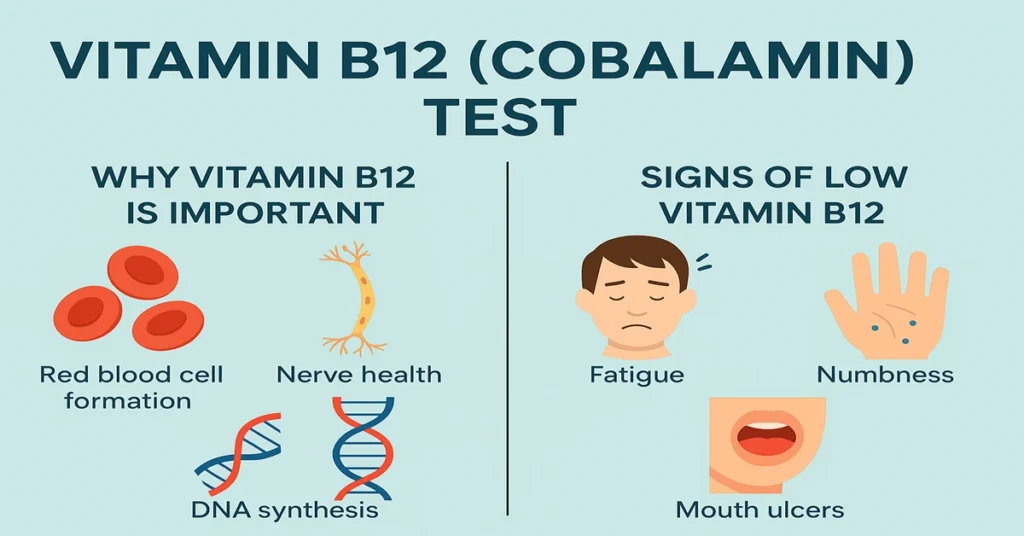What is Vitamin B12?
Vitamin B12, also known as Cobalamin, is a water-soluble vitamin belonging to the B-complex group.
It is essential for red blood cell production, nerve function, DNA synthesis, and brain health.
Unlike most other B vitamins, Vitamin B12 is found mainly in animal-based foods such as meat, fish, eggs, and dairy products.
The human body stores Vitamin B12 in the liver, which can maintain reserves for several years, but continuous intake is still needed to prevent deficiency.
Where is Vitamin B12 Produced or Synthesized in the Body?
- The human body cannot produce Vitamin B12 naturally.
- It must be obtained from dietary sources or supplements.
- Certain bacteria in the colon (large intestine) produce small amounts of B12, but this cannot be absorbed because Vitamin B12 absorption occurs in the small intestine.
Therefore, adequate intake through food or supplements is necessary for maintaining normal levels.
Main Functions and Importance of Vitamin B12
Vitamin B12 plays several crucial roles in maintaining body health and neurological function.
1. Red Blood Cell Formation
Vitamin B12 helps produce healthy red blood cells (RBCs).
A deficiency can cause megaloblastic anemia, where large, immature RBCs fail to carry oxygen properly, leading to fatigue and weakness.
2. Nervous System Health
B12 maintains the myelin sheath, a protective covering around nerves.
This ensures proper nerve signal transmission and prevents nerve damage, numbness, and tingling sensations.
3. DNA Synthesis
It is vital for cell division and genetic stability.
Without B12, cells cannot divide normally, affecting rapidly growing tissues like blood, skin, and intestinal lining.
4. Brain and Cognitive Function
Vitamin B12 supports memory, focus, and mood regulation.
Deficiency has been linked to cognitive decline, depression, and dementia-like symptoms in older adults.
5. Energy Metabolism
B12 helps convert carbohydrates, proteins, and fats into energy in cooperation with other B vitamins.
It supports the body’s natural energy production process.
6. Homocysteine Regulation
It works with Vitamin B9 (Folate) to lower homocysteine levels, which helps maintain heart and brain health.
Causes of Low Vitamin B12 Levels (Deficiency Causes)
Several conditions and factors can cause Vitamin B12 deficiency:
- Pernicious Anemia – An autoimmune condition that destroys stomach cells producing intrinsic factor, necessary for B12 absorption.
- Vegetarian or Vegan Diet – Since plant-based foods lack natural Vitamin B12, deficiency is common without supplements.
- Malabsorption Disorders – Such as Celiac disease, Crohn’s disease, or gastric bypass surgery, which reduce absorption.
- Chronic Alcoholism – Interferes with digestion and nutrient absorption.
- Medications – Long-term use of metformin (for diabetes) and proton pump inhibitors (acid reducers) can reduce absorption.
- Elderly Age – Reduced stomach acid production with age leads to poor absorption.
Symptoms of Vitamin B12 Deficiency
Deficiency affects both blood formation and the nervous system. Common signs include:
- Fatigue, weakness, dizziness
- Pale or jaundiced skin
- Megaloblastic anemia (large, immature red blood cells)
Neurological symptoms:
- Tingling or numbness in hands and feet (peripheral neuropathy)
- Poor balance and coordination
- Memory loss, confusion, or cognitive decline
- Mood changes – depression, irritability, or anxiety
Other signs:
- Glossitis (red, swollen tongue)
- Mouth ulcers
- Shortness of breath
- In severe or long-term cases, irreversible nerve damage may occur.
Causes of High Vitamin B12 Levels
High B12 levels are uncommon but can occur due to:
- Excessive supplementation or repeated B12 injections
- Liver disease (vitamin released from damaged liver cells)
- Kidney failure (impaired clearance of B12 from the blood)
Symptoms of High Vitamin B12 (Toxicity)
Vitamin B12 is water-soluble, so dietary excess is excreted via urine and rarely causes toxicity.
However, extremely high doses (especially injections) can cause:
- Mild acne-like rash or skin breakout
- Headache or anxiety (rare)
- Temporary nausea or bloating
No upper safe limit is established for dietary intake.
Reference Range (Normal Blood Levels)
| Parameter | Reference Range |
|---|---|
| Normal Vitamin B12 (Cobalamin) | 200 – 900 pg/mL |
| Deficiency | < 200 pg/mL |
| Borderline | 200 – 300 pg/mL |
If levels are borderline, additional testing such as Methylmalonic Acid (MMA) or Homocysteine is recommended to confirm early deficiency.
Sample Type and Testing
- Sample Type: Blood (serum or plasma)
- Additional Test: Methylmalonic Acid (MMA) — detects early or hidden deficiency.
- Fasting: Usually not required, but may be suggested if combined with other vitamin tests.
Test Preparation
To ensure accurate Vitamin B12 results:
- Avoid taking multivitamins or B12 supplements for 24–48 hours before testing.
- Inform your doctor about medications such as metformin, PPIs, or supplements.
- Follow fasting instructions only if prescribed for other tests.
When to Consult a Doctor
You should see your doctor if you experience:
- Persistent fatigue or weakness
- Numbness, tingling, or balance problems
- Mood changes or memory issues
- Pale skin or mouth ulcers
- If you follow a vegan diet or have digestive disorders
Doctors may recommend:
- Vitamin B12 level testing
- Supplementation (oral or injection form)
- Further evaluation for anemia or absorption issues.
Important Word Explanations
| Word | Meaning |
|---|---|
| Cobalamin | Scientific name for Vitamin B12. |
| Intrinsic Factor | A stomach protein required for Vitamin B12 absorption. |
| Megaloblastic Anemia | Condition with large, immature red blood cells due to Vitamin B12 or Folate deficiency. |
| Peripheral Neuropathy | Nerve damage causing tingling or numbness in hands and feet. |
| Homocysteine | Amino acid that increases when B12 or Folate levels are low, affecting heart health. |
| Methylmalonic Acid (MMA) | A marker test used to detect early Vitamin B12 deficiency. |
~END~

